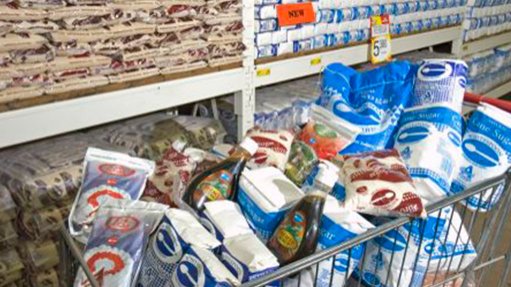
Declining global and European Union (EU) market sugar pricing, currency volatility and the impact of poor weather on the South African cane crop have dented sugar producer Illovo’s profitability, narrowing operating profit for the year ended March 31 by 12.3% to R1.65-billion and narrowing headline earnings by 7.7% to 179c apiece.
The group outlined in a preliminary results statement on Monday that a strong domestic market was unable to offset world sugar prices and currency headwinds, which affected yearly earnings.
“Market conditions have not been easy over the last year…and adverse weather conditions in South Africa also resulted in considerable cane yield losses. Notwithstanding these factors, we continue to move forward on a number of fronts to reposition the business,” commented MD Gavin Dalgleish.
He added that the company had, however, realised gains from the full-year
benefits of the new distillery in Tanzania, growing proceeds from electrical cogeneration in Swaziland, higher ethanol exports from South Africa and meaningful cost reduction from the group’s continuous improvement initiatives.
“We also benefited from better pricing in domestic and some regional markets and improved market regulation in South Africa and Tanzania,” he said.
By country, 38% of the group’s operating profits emerged from Malawi, while Zambia contributed 35%, South Africa 13%, Tanzania 9%, Swaziland 4% and Mozambique 1%.
Sugar production contributed 71% of Illovo’s operating profit, while cane growing contributed 13% and downstream activities 16%.
SUGAR PRODUCTION
Sugar production for the year of 1.76-million tons was affected by the drought and winter frost in South Africa, but remained “reasonably close” to 2014’s 1.83-million tons, with the benefit of record sugar production in Zambia, Mozambique and at the Dwangwa mill, in Malawi, and a strong performance improvement in Tanzania.
“This achievement once again underscores the value of the geographic spread of the group’s largely irrigated cane growing outside of South Africa and sugar milling assets in mitigating climate risks,” Dalgleish held.
Consistent milling operations in Tanzania supported the “strong” output of potable alcohol at Illovo’s Kilombero distillery, exceeding the first full-year investment case assumptions.
Increased proceeds from electrical cogeneration in Swaziland and record ethanol production at South Africa’s Merebank and Glendale distilleries supported the downstream performance, impacted only by the lower drought-affected furfural production at the Sezela sugar and downstream plant.
Dalgleish added that the group’s commercial and trade advocacy teams continued to make “sound” progress in growing domestic, regional and niche markets ahead of the EU market reform in 2017.
Bulk raw exports to the EU reduced by 73 000 t compared with the previous year, while speciality sugar exports to the EU continued to deliver a premium to regional markets.
Regional sales increased by 42 000 t, with strong demand growth, particularly in
Zambia.
Meanwhile, the introduction of an effective dollar-based reference price import duty in South Africa reduced sugar imports from 462 000 t in the 2013/14 season to 137 000 t in 2014/15, impacting positively on local industry sales.
In Tanzania, Illovo outlined that the political recognition of the long-term damage to the domestic economy of illegal sugar imports and the emerging measures to control these trade flows resulted in a significant recovery in domestic sales volumes.
In Malawi, the strong kwacha, high interest rates and little or no economic growth, saw domestic demand under “significant” pressure.
PROSPECTS
Dalgleish reiterated that a key principle of Illovo’s strategy was to diversify its product mix to offset the cyclicality in its business caused by unfavourable weather conditions, world market-influenced sugar pricing and currency
fluctuation.
Initiatives, including the Zambian refinery expansion and product alignment project announced during the year, to shift the group sugar export sales mix away from the EU, were progressing well and two further downstream investment projects were under review, he said.
“As part of our drive for greater operational efficiencies, structural cost reduction programmes will continue to build on the good results achieved by the group-wide continuous improvement programme during the year.
“However, the already-challenging market conditions are expected to become more difficult in the year ahead,” he cautioned.
Proceeds from EU sales were expected to fall owing to the impact of a weaker euro and the recent depreciation in the Brazilian real against the dollar, which had provided an export incentive to Brazil’s sugar producers.
Illovo’s sugar production for the 2015/16 season was expected to be marginally lower than the prior year, owing mainly to the continuing effect of drought and frost in South Africa.
The consistent ongoing growth in global and African demand – around 2% and 3% respectively – could, however, signal improved longer-term prospects, Dalgleish said.